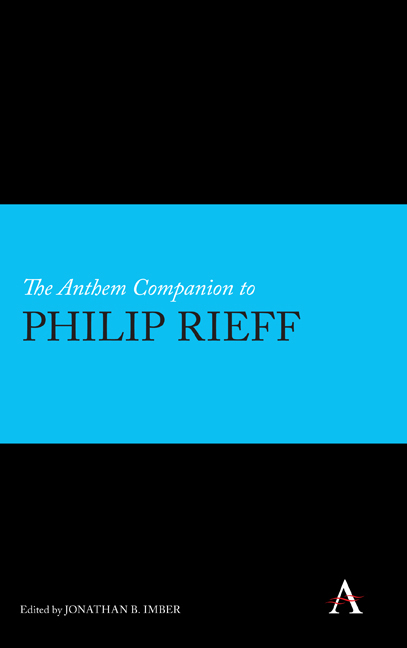Book contents
- Frontmatter
- Contents
- Introduction
- Chapter 1 Philip Rieff: Some Reflections
- Chapter 2 Philip Rieff and the Impossible Culture
- Chapter 3 Philip Rieff as Cultural Critic
- Chapter 4 Philip Rieff as Teacher
- Chapter 5 Prophet v. Stoic: Philip Rieff's Case against Freud
- Chapter 6 Decline and Fall in the Work of Philip Rieff: “I love the old questions” Beckett, Endgame
- Chapter 7 Philip Rieff as Social/ Cultural Theorist
- Chapter 8 Fellow Sons
- Chapter 9 Philip Rieff and Social Theory
- Chapter 10 A Kindly Apocalypse: Philip Rieff and the Endgame of the Therapeutic
- Chapter 11 Disenchantment, Authenticity and Ordinary Charisma
- Writings of Philip Rieff
- List of Contributors
- Index
Chapter 10 - A Kindly Apocalypse: Philip Rieff and the Endgame of the Therapeutic
Published online by Cambridge University Press: 21 June 2018
- Frontmatter
- Contents
- Introduction
- Chapter 1 Philip Rieff: Some Reflections
- Chapter 2 Philip Rieff and the Impossible Culture
- Chapter 3 Philip Rieff as Cultural Critic
- Chapter 4 Philip Rieff as Teacher
- Chapter 5 Prophet v. Stoic: Philip Rieff's Case against Freud
- Chapter 6 Decline and Fall in the Work of Philip Rieff: “I love the old questions” Beckett, Endgame
- Chapter 7 Philip Rieff as Social/ Cultural Theorist
- Chapter 8 Fellow Sons
- Chapter 9 Philip Rieff and Social Theory
- Chapter 10 A Kindly Apocalypse: Philip Rieff and the Endgame of the Therapeutic
- Chapter 11 Disenchantment, Authenticity and Ordinary Charisma
- Writings of Philip Rieff
- List of Contributors
- Index
Summary
A man suffers little from unfulfilled wishes if he has trained his imagination to think of the past as hateful.
– Friedrich NietzscheWe would rather be ruined than changed We would rather die in our dread Than climb the cross of the moment And let our illusions die.
– W. H. AudenBourgeois Revolutionaries
In J. G. Ballard's novel, Millennium People, a psychologist named David Markham and his wife Sally wait for a taxi to take them to Heathrow Airport so that they may attend a conference for industrial psychologists at Celebration, the planned community in Florida built by the Disney Corporation. Markham frets to his wife about having to shake hands with amusement park workers dressed in costumes as cartoon characters, to which his wife replies, “Don't be mean. They remind them of their childhoods.” “Childhoods they didn't have,” the husband counters, “What about the rest of us— why do we have to be reminded of American childhoods?” Counters Sally, “That's the modern world in a nutshell” (Ballard 2004, 15– 16). The brief exchange in which cultivated British professionals pay grudging tribute to the enduring and inescapable influence of American culture is, fittingly enough, followed by the report on the television of a terrorist bombing at the airport that takes the lives of several travelers returning from abroad.
The overt juxtaposition of an icon of American popular entertainment with a lethal terrorist attack might come across as somewhat glib against the contemporary realities of religious violence and the debt crisis in the West, but the explosion, which takes the life of Markham's ex- wife, draws the psychologist into the strange but bustling subculture of weekend activism in London as he sets out to find the culprit who planted the bomb. Markham encounters politically engaged members of the middle class taking to the streets to prohibit a bewildering assortment of activities, from laboratory experimentation on animals to tourism in Third World countries, or abolishing Britain's venerable traditions, such as fox hunting and the Henley Regatta. The frivolous and trifling nature of most of these protests does not diminish but, in fact, heightens the stridency and vehemence with which the demonstrators denounce what in their eyes can only be heartless injustices and barbaric iniquities.
- Type
- Chapter
- Information
- The Anthem Companion to Philip Rieff , pp. 167 - 188Publisher: Anthem PressPrint publication year: 2018

